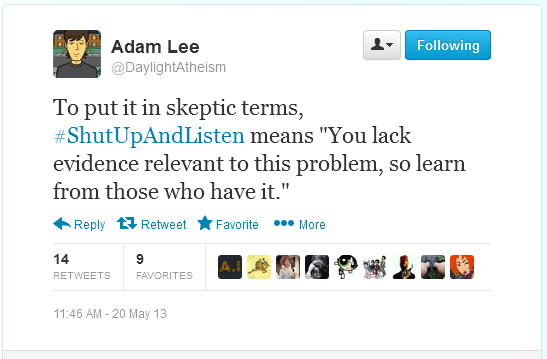Dear beloved men:
Yes, I know you’re a liberal, feminist guy. You totally get it! You really do. For example, you regularly read my blog because you like what I have to say about various and sundry issues that shape our shared world.
But there is something you don’t get. You can never get it, not really. Because the world we share frequently looks very different through the eyes of women. Note that this doesn’t mean you see the world more objectively and women (or others) less so, nor vice versa. It means that, although we inhabit the very same spaces and travel the same paths, our experiences are objectively different.
Think of it this way: if you’re white in the USA, you probably do not live in fear of police, whereas if you’re black you do (for very good reasons that I’m sure I don’t have to explain to readers here). Your educational experience in public school settings is likely to be drastically different, from the physical infrastructure, access to quality materials and technology, to what happens if you get in trouble. I cannot ever really understand what it is like to experience the world as a person of color does. While we all inhabit a culture that reinforces white supremacy in a million ways 24/7/365—such that even very young black children internalize it—I cannot know what that experience is like as a person of color.
But that fact should not stop me from listening to, learning from and empathizing with people of color. Indeed, as someone with a conscience and a desire to make our world a better place, it demands it. It also demands that I leverage my white privilege to right the wrongs of racism, because people of color cannot.
I’m sure you can see where this is going: the same principle is at work with sexism. Like racism, it is not always blatant; much of it operates below the level of conscious awareness. This is why I need you—yes, you, my dear d00d—to listen to, learn from and empathize with women, and to leverage your male privilege to right the wrongs of sexism, because women cannot.
To that end, here are things I want you to read:
Why Women Smile at Men Who Sexually Harass Us. Olsen, H.B., Medium (Feb. 2016).
The White Knight Delusion. Wilkinson, A., The Baffler (Feb. 2016).
Abortion ban linked to dangerous miscarriages at Catholic hospital, report claims. Redden, M., The Guardian (Feb. 2016).
Buzzfeed Writer Harassed off Twitter for Urging “Not-White, Not-Male” Writers to Pitch to Buzzfeed Canada. Cox, C., The Mary Sue (Feb. 2016).
This Facebook post by Harper Honey (shared with permission):
Trust Your Gut! Sara, M., Femnasty (Feb. 2016).
Not a Nice Story. Darcy (Guest Post), Love Joy Feminism/Patheos (Feb. 2015).
The remarkably different answers men and women give when asked who’s the smartest in the class. Paquette, D., Washington Post (Feb. 2016).
Conservative Trolls Have Been Suggesting Men Go into Women’s Restrooms to Help Legislators Discriminate Against Trans People. Brownstone, S., The Stranger (Feb. 2016).
NYPD Really Wants You To Know They’re Cracking Down On Subway Perverts. Chung, J., Gothamist (Feb. 2016).
__________
When you read these things, you will notice that women inhabit a very different world than you do. We are not safe from gendered harassment, abuse and violence; not on crowded subway trains or at quiet bus stops, alone or with friends, at our jobs, in the toy aisle at Target, on the street, at small dinner parties, in public restrooms, on Twitter, in our own homes, in fucking hospitals. We cannot escape our gender and bias against it. We are routinely demeaned, diminished and degraded in virtually every facet of our lives, from cradle to grave, in countless ways, both blatant and perniciously, infuriatingly subtle. Most of us learn from a very young age that we can never, ever really let our guard down among men—nor, frankly, among women (and others) who support, consciously or otherwise, the individuals, institutions and cultural practices that perpetuate male privilege. Some of us may have made a devil’s bargain, but it is not an inherently irrational choice. I’m not sure it is a choice at all, at least for some.
And you will also surely have noticed that all of those links are from February alone. I made no special effort to seek these stories out; they were sprinkled among literally dozens of open tabs in my browser. It was only when I went to compile a link roundup last week that I realized how many they were in number.
Was that too big an ask of me, that you read all of ^that stuff? Well, consider your privilege: you can look away from any or all of it, any time. You can ignore all of it, without much risk (if any) to your career or your mental health or your physical safety or your life. We cannot. Ever. That’s why I want you to read it—all of it—even (especially) if you don’t want to: to give you some glimmer of what it is like for us to exist in this world. I am asking you to listen to, learn from and empathize with women, and to leverage your own privilege to right the wrongs of sexism.
Here is what that might look like:
Learn to see it for what it is. I’ve written before in some depth about microaggressions, and studies that reveal (a) microaggressions may be more harmful than overt bigotry, (b) racism, sexism, other -isms are mainly perpetuated due to unconscious bias, and (c) it is extraordinarily difficult to get (presumably well-meaning) people to realize they are acting in an unfairly biased manner. I won’t rehash all of that in detail here. But there are other behaviors that you might pay attention to. For instance, while you personally do not harass, abuse or rape women, people you know almost certainly do. These are not strangers hiding in the bushes: they are your fathers and brothers and sons, your friends and co-workers, admired professional colleagues and community members in good standing, who “would never do anything like that.” But don’t take my word for it: they will tell you so themselves. The d00d cracking “jokes” about physically/sexually assaulting women, or making “funny” quips about women as intellectually inferior, untrustworthy, manipulable, sex objects, obstacles to be overcome, etc., is telling you exactly how he thinks of us and treats us whenever he can get away with it.
Call it out when you see it. Sexist and predatory men take your laughter, however insincere, as validation. They take your silence as validation. They take shitty beer commercials that objectify women as evidence that their views are valid and the norm. One thing that can help change the culture in which unconscious biases flourish and predatory weasels operate with impunity is men shutting that shit down. In social situations: “Not cool, d00d.” “Wow, not funny.” “Did you just grab that woman’s ass? That is seriously messed up.” “What the fucking fuck is wrong with you, you fucking fuck?” In work and school situations: “Yes we heard you the first time Bob, but now we’d all really like to hear what Cynthia has to say.” “Rani just made that suggestion Malcolm, I’m glad you agree with her.” You see, when we do this, we are abrasive, oversensitive, humorless feminazis who cannot take a joke OBVIOUSLY. We need you to do it.
Believe us. When we tell you this shit is happening, all the fucking time, know that we’re not “playing the victim.” FYI: there is no reward for being a victim, much less one that somehow makes it worth being victimized in the first place.
You, my beloved men, are not “the enemy,” so much as the systems that uphold your privilege at the expense of ours is the enemy. I am asking for your help in dismantling them. Interrupting them. Burning them the fuck down.
Just as racism is whites’ problem to solve, sexism is yours.
You’re creative, and resourceful. I know you can and will find ways to disrupt and smash this shit to pieces. It might even turn out to be fun, if a little uncomfortable at first.
Thanks for your consideration.
Have a nice day.


